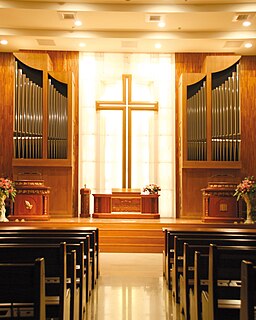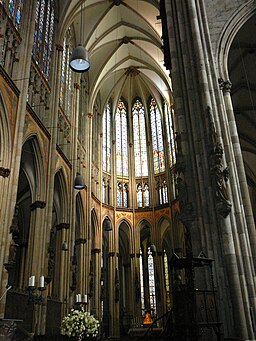In spite of my Missouri Synod Lutheran parochial school
upbringing, I used to cross myself in private when I was a little girl. Lutherans didn’t do that. Not Missouri Synod Lutherans anyway. It was too superstitious, too…Catholic.
 |
| By Ulrich Sekat (Waldkircher Orgelbau Jäger & Brommer) [CC-BY-SA-3.0 (www.creativecommons.org/licenses/by-sa/3.0)], via Wikimedia Commons |
Protestants, generally speaking, are fond of words. They are objective, literal; they have an
intellectual faith. This is not to say
that their faith does not flourish in a relationship with Jesus. It is only to say that their faith is based
in words, the Word, verbal-linguistic understandings written on their hearts in
relationship.
This is mete and right, considering the historical roots of
the Reformation. It is the legitimate
product of an authentic response to the movement's perception of Catholicism, warts and all, in the Sixteenth Century. It is an outgrowth of the movement's subsequent coming of age and
its shaping by eighteenth and nineteenth century Protestant experience.
Catholicism, while it watched and acknowledged Protestant
fist shaking, breaking away, and coming of age, offered some legitimate response with the Catholic Counter-Reformation, yet held fast to its sensory
experience of God. Catholics, and the
Orthodox for that matter, feel God in their core, smell him in incense, hear
him in bells, chant, and murmurs…taste him on their tongue. And contrary to general Protestant
understanding, this sensory perception of God manifests in relationship with
him and his Son.
 |
| By Pascal Reusch [CC-BY-SA-3.0 (www.creativecommons.org/licenses /by-sa/3.0) or GFDL (www.gnu.org/copyleft/fdl.html)], via Wikimedia Commons |
Having walked this path to my current place, my experience
of the Saints has been a colliding of traditions. I have, at once, been sucked into them and
leery of them. Fascinated, drawn, and
cautioned. A fundamentalist childhood
training does not fall easily away. I
know superstition when I see it…both in those who approach the Saints with it, and in those who caution against approaching the Saints at all. But the
Saints never stop haunting my walk.
I am steeped enough in an Earthly family with a rich heritage and lore, to know that my Heavenly family is part of me, written on my spiritual DNA. Not to be ignored.
I am steeped enough in an Earthly family with a rich heritage and lore, to know that my Heavenly family is part of me, written on my spiritual DNA. Not to be ignored.
 It is from this place that I prepare to approach the reading
of The Lure of Saints: A Protestant Experience of Catholic Tradition
It is from this place that I prepare to approach the reading
of The Lure of Saints: A Protestant Experience of Catholic Tradition
Perhaps we shall meet again on this topic, you and I, and I will fill you in on the
unfolding of the experience.





What a beautifully worded and understanding post! The heading captured my attention because as a Catholic, the Saints are an issue of conflict (unfortunately) that seems to arise again and again with my Protestant friends.
ReplyDeleteI suppose I have only my own personal experience to draw on but I don't believe the Saints are only meant for Catholics either. I think that the example of their lives can be inspiring to anybody seeking God and seeking comfort of knowing that in our human condition, we are not alone. There are all manners of saints who have found their way to God...something for everyone and every experience. :)
I truly love reading about the lives of the saints and I feel them present in my life. Their have been times when I have had knowledge of particular saints with me at certain moments that was beyond my doubt...and I guess I think, why shouldn't they be with us, praying for us? We are after all, the body of Christ and there is no limit of time in God's eyes.
This may sound like rambling, I only have a few moments right now though.:) I hope you understand what I mean.
Wishing you a blessed Lent.
You and I seem opposite in preference. Though I see why people value sensory experience in worship, I find it distracting. It is a brain processing thing - If I focus on the ritual I lose the connection to spirit and if I focus on the connection to spirit I lose my place in the ritual. So I prefer quietly meditative spiritual practice. If there were not a Unity Church in my city I'd probably attend Quaker meetings.
ReplyDeleteThe Saints make sense to me too, always have, because I see archetypes everywhere.
It sounds like an interesting book...although I'm often leery of people to "dabble" in other traditions cafeteria style. But this does sound like an informative book.
ReplyDeleteBut, your first paragraph made me chuckle. My LCMS pastor brother-in-law and my sister cross themselves quite often in church...as did many members of my LCMS parish before I left. Some left-to-right and other right-to-left. We were quite the mixed-up little group ;) I was told that Luther taught his congregation to cross themselves in the Orthodox manner since that was the more ancient practice. I'm not sure how true it is though.
Hi there, I just ordered a couple of headcoverings and found your blog. What a gem! Thank you for including us lesser known Eastern Orthodox folks in your ramblings;) I always try and remind people that we were the same Apostolic and Catholic church for 1000 years. We have much in common!
ReplyDeleteTo address a PP, I find a lot of solace in the beautiful and holy rituals of the church. It isn't for God. He doesn't need those things but as a fallen human being, sometimes I do...to feel the presence of the holy spirit, which I have never ever felt in any other church than the Orthodox faith. I believe God speaks to us in many different ways. I appreciate much about the Quakers (and plainspeople in general) and I bet you God speaks to them in ways that they couldn't appreciate in the church I go to. That is what matters most!
I also like to engage the senses in relationship with God. I keep thinking about how you crossed yourself as a child. Most mornings, I make the sign of the cross on my forehead when I shower ... a reminder of my baptism.
ReplyDeleteThank you for this. Caught, too, between Catholicism and Protestantism, I love them both and didn't understand why each alone did not bring God to life in His fullest. This makes a lot of sense. The Word and the Experience. We need both.
ReplyDelete